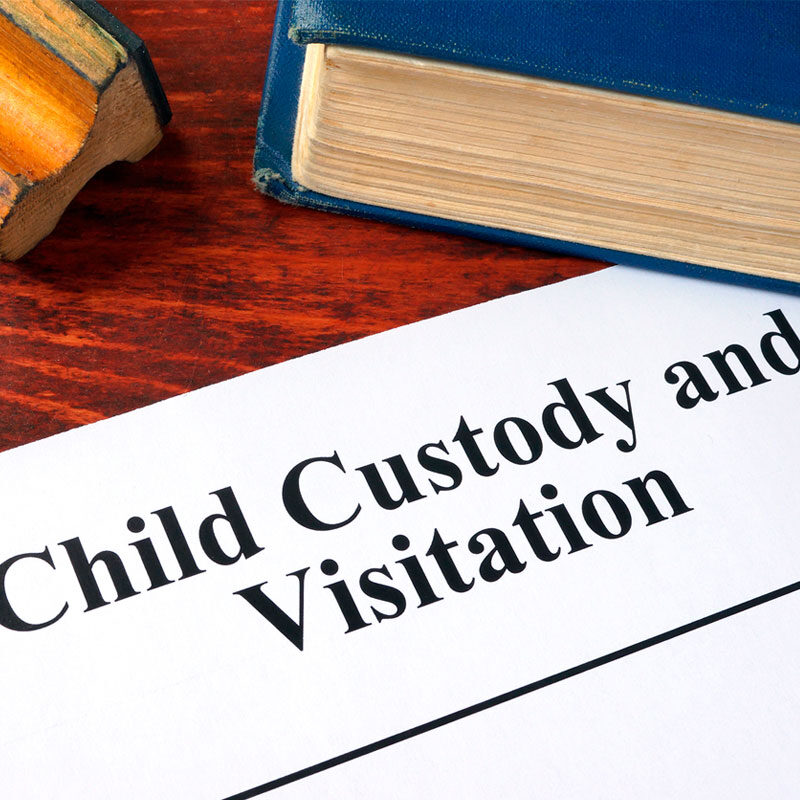
Chesterfield County, Virginia is no stranger to custody cases. Hundreds of child custody cases are filed in the Chesterfield County courts every year. These can be stand-alone custody and visitation cases, or they might be part of a divorce proceeding. Divorce is already a stressful time in your life for many reasons, but adding custody disputes can make it even more difficult.
Property division or equitable distribution and child custody are two of the most common reasons divorces in Virginia become contested. As a parent, you care deeply about your children and want them to be safe and secure, which usually means you want them to live with you. If you are facing custody issues in Chesterfield County, you need experienced Chesterfield County family lawyer that you can trust. The law office of Melone Hatley, P.C. has years of experience fighting Virginia child custody disputes, and we are ready to help you deal with the emotional and stressful processes involved in your child custody dispute.
Why Choose Melone Hatley, P.C.?
Child custody disputes can be mentally and emotionally draining. They can take a significant amount of time because both parents often want the best for their children, but disagree about what that means. When each parent passionately fights for what they think is right, the dispute can quickly escalate.
Having the VA child custody lawyers at Melone Hatley, P.C. on your side can give you the upper hand in your family law case. Why should you choose Melone Hatley, P.C., as your child custody attorneys? Following are just a few reasons:
- We provide you with a listening ear with an eye toward legal requirements and options. Having a rational sounding board to help with your child custody dispute is invaluable. The experienced attorneys at Melone Hatley, P.C. will walk through your rights and responsibilities in your child custody case and give you practical legal advice to help you accomplish your goals.
- You will receive straightforward, practical legal advice. Melone Hatley, P.C. will provide you direct legal advice that helps you realistically evaluate all of your options in a child custody dispute. Our team of experienced trial attorneys will help you fight to keep your children safe and healthy while working with you to ensure that your goals are met.
- You will get the benefit of big law resources with small law firm attention. Big law firms have significant resources to address your child custody dispute. However, the bigger the firm, the more likely they are to provide an experience that is generic and not personalized to your specific case. At Melone Hatley, P.C., we know your name, we know your case, and we care about your outcome. We offer the resources of a big firm with a personal client relationship for you which helps us provide better, more comprehensive legal services for domestic relations issues.
- You will get tailored legal services to meet your needs. At Melone Hatley, P.C. we work with you to figure out the best option for your case. Some child custody cases require us to be aggressive and ready to fight for you; while, for others, we can accomplish your goals through mediation or a more collaborative approach.
At Melone Hatley, P.C., we pride ourselves on our client service, and our high ratings among our prior clients prove that. We encourage you to read our reviews before deciding which child custody attorney is best for your family. Our team has experience assisting clients with complex custody issues that arise in challenging Virginia divorce cases, including clients throughout Chesterfield County, Richmond, Henrico, Midlothian, Hanover, Powhatan, Glen Allen, and Colonial Heights. We also assist those in coastal Virginia near our Virginia Beach office and Northern Virginia near our Fairfax office.
Whether you need help fighting for child custody or understanding your parental rights, or you need legal representation for any other related issues, Melone Hatley, P.C. will help you. We offer sound legal advice so you can work toward the best outcome for everyone involved.
Schedule your free meeting with our team today to see if our Child Custody Lawyers can help you.
How is Child Custody Determined in Chesterfield, Virginia?
Child custody determinations in Virginia focus on the best interests of the child pursuant to Virginia Code 20-124.3. The court will look at a variety of factors to determine which parent should have custody of a child. In most cases, both parents will have at least partial custody, but there are some situations where just one parent will have sole legal custody or sole physical custody.
Factors that the court will often review include things like the age and mental and physical health of both the child and the parents. It will also review the relationship between each parent and the child. If the child is old enough, the court might also consider where the child would like to live.
The court will also examine the parents’ ability to support the child and their living arrangements. Financial aspects are reviewed, but they are not conclusive — that is, just because one parent might have more money or assets than the other does not necessarily mean that they will be awarded custody.
The time each parent can spend with the child will also be considered. For instance, if one parent works 80 hours a week, forcing the child to be in daycare or in the care of a family member, that will be considered when determining custody.
The court will also take any history of domestic abuse into account as well. Criminal record, particularly if it involves violence, might also be something the court will consider.
Chesterfield County Child Custody Lawyer Near Me 800-479-8124
What Are the Different Types of Custody in Chesterfield County?

There are several types of custody in Virginia. Each type provides different rights and responsibilities, and no single type of custody depends on the other.
Temporary Custody
Temporary custody sets out the living arrangements for the child during a formal custody dispute. Temporary custody is exactly how it sounds — it is a limited-time arrangement that could be changed later.
Joint Legal Custody
Most cases will start with the understanding that custody will be shared between both parents, including joint legal and physical custody. Joint legal custody means that both parents will have equal input on big decisions regarding the child, such as education, religious upbringing, and healthcare.
Sole Legal Custody
In sole legal custody arrangements, just one parent makes decisions regarding the child in the areas of welfare, education, and the like. The other parent might be consulted, but the parents do not have to agree on these issues. The parent with sole legal custody makes the final decisions.
Sole Physical Custody
The child will reside with the parent who has sole physical custody. The other parent might still have visitation rights, but the child will generally call just one location home.
Primary Physical Custody
The child spends most of their time with the parent with primary physical custody. The other parent is often referred to as the non-custodial parent.
Split Custody
In split custody arrangements, one parent will have custody of one child, and the other parent will have custody of another child. Essentially, split custody arrangements separate siblings between the parents. These arrangements are rare because most courts (and experts) agree that keeping siblings together in one household is good for the children’s health and well-being.
Shared Custody
Most custody arrangements involve some kind of shared custody. In a shared custody arrangement, both parents have physical custody at least part of the time.
Custody will most often only consider the parents of the child. Other family members, including grandparents, generally do not have any rights to custody in Chesterfield County. There might be some limited circumstances where custody to grandparents might be granted. Grandparents might also be able to gain visitation in some situations as well.
Click to contact our Chesterfield County Family Lawyers today
How Do Chesterfield Courts Determine Visitation?
The term “visitation” refers to the physical time that each parent (or sometimes other family members) will spend with a child. The Virginia courts review many of the same factors to determine custody to decide whether to award visitation. For example, if there is a history of domestic violence involved, visitation might not be awarded at all, or perhaps only supervised visitation will be allowed.
Scheduling visitation varies a great deal depending on the individual schedules of everyone involved. For instance, things like work schedules and extracurricular activities will often affect when visitation can take place.
Visitation is something the court will generally allow unless there are extreme circumstances, such as neglect, abuse, or alcohol or drug addiction issues. Visitation and custody often go hand in hand — if the parents share physical custody, the parties must arrange visitation with the non-custodial parent.
Schedule a call with one of our client services coordinators today
How is Child Support Calculated in Chesterfield County?

Child support calculations take into account virtually every aspect of each parent’s finances, from regular income to costs associated with care for the child. The court will thoroughly review the following factors before determining how much child support should be.
Income
The court will review each party’s income. While other factors are considered, income is perhaps the most important factor that the court will consider when determining child support.
Alimony
Alimony (called spousal support in Virginia) is an amount of money provided from one spouse to the other. It can be part of a divorce agreement, or it might be ordered by the court. Spousal support helps the lower-earning spouse maintain their standard of living.
Alimony is technically a separate payment, but it is considered income when calculating the appropriate amount of child support. As a result, if alimony is higher, then child support might be lower.
Medical Insurance of the Child
If one parent pays medical insurance for the child, that will be considered part of the child support calculation. Insurance payments can reduce or increase child support, depending on who is receiving or making child support payments.
Child Expenses
The expenses of the child might affect child support calculations in some situations. Regular expenses are “built-in” to the calculation, but extraordinary expenses can change child support amounts. For instance, if the child requires extra medical care or has special education needs, those expenses should be part of the child support calculation.
Where Should You File Your Child Custody Case in Chesterfield County?
You can file a child custody case in the local court where the child lives (and has lived for the past six months), or you can file in any county where the parent lives. Generally, to file in Chesterfield County, either the child or at least one parent should live here.
Why Do You Need a Chesterfield County Family Law Attorney?
A family law attorney can help with any legal aspect that affects your family, including the following practice areas:
- Divorce
- Child custody
- Adoption and foster care
- Paternity
- Child support determinations
When the law impacts your family, you need an experienced family law attorney to help you with these challenging legal issues. Melone Hatley, P.C. is an excellent resource if you are facing any family law matter in Chesterfield County, VA.
Are Your Parental Rights Protected?
We know how important your children are to you, and we will fight for their welfare alongside you. Contact the Chesterfield County child custody attorneys and family lawyers at Melone Hatley, P.C. for more information about how we can help.
Schedule a call with one of our client services coordinators today.


























